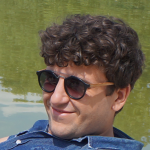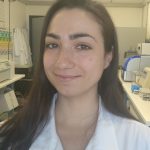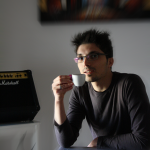Per qualsiasi comunicazione circa gli eventi di FuturoINAREA potete scrivere a futuroinarea@area.ba.cnr.it o compilare il modulo a fondo pagina.

Mariella Aquilino
(IIA - Istituto sull’Inquinamento Atmosferico) aquilino@iia.cnr.itLaurea Ingegneria Ambientale (2012, UniBa), master in Space technologies for remote sensing (2015, UniBa), dottorato in Rischio, Sviluppo Ambientale, Territoriale ed Edilizio (2022, PoliBa). Lavora presso il CNR dal 2018. Principali interessi: digital image and signal processing, inverse modelling of remotely sensed data, aerial and satellite imagery navigation and registration. Partecipa alle attività di FuturoINAREA dal 2019.

Bachir Balech
(IBIOM - Istituto di Biomembrane, Bioenergetica e Biotecnologie Molecolari) b.balech@ibiom.cnr.itLaurea in Ingegneria Agraria (2004, Università di Beirut), master in Integrated Pest Managment (2008, CIHEAM-Bari), master in Bioinformatica (2011, IBM-Italia), dottorato in Genetica ed Evoluzione Molecolare (2012, UniBa). Lavora presso il CNR dal 2012. Principali interessi: Bioinformatica, Biodiversità Molecolare, Nutrizione e Microbioma. Partecipa alle attività di FuturoINAREA dal 2019.

Danilo Belviso
(IC - Istituto di Cristallografia) danilo.belviso@ic.cnr.itLaurea in Chimica (2008, UniBa), Dottorato in Sintesi Chimica ed Enzimatica (2012, UniBa). Lavora presso il CNR dal 2012. Principali interessi: Biologia/chimica strutturale, tecniche basate su raggi X, studio di proteine. Partecipa alle attività di FuturoINAREA dal 2019.

Arianna Consiglio
(ITB - Istituto di Tecnologie Biomediche) arianna.consiglio@cnr.itLaurea in Informatica (2006, UniBa), Master in Governo dei Sistemi Informativi (2009, Università Roma Tre), Dottorato in Informatica (2016, UniBa). Lavora presso il CNR dal 2009. Principali interessi: Bioinformatica, analisi di dati NGS, Intelligenza Computazionale. Partecipa alle attività di FuturoINAREA dal 2019.

Nicola Corriero
(IC - Istituto di Cristallografia) nicola.corriero@ic.cnr.itLaurea in Matematica (2004, UniBa), laurea in Informatica (2007, UniBa), dottorato in Informatica (2011, UniBa). Lavora presso il CNR dal 2012. Principali interessi: metodi cristallografici, sviluppo di software, machine learning. Partecipa alle attività di FuturoINAREA dal 2019.

Vincenzo Laporta
(ISTP - Istituto per la Scienza e Tecnologia dei Plasmi) vincenzo.laporta@istp.cnr.itLaurea in Fisica (2003, UniBa), Dottorato in Fisica delle alte energie (2007, UniBa). Lavora presso il CNR dal 2018. Principali interessi: dinamica molecolare ab-initio; sistemi in non equilibrio termodinamico; modelli prebiotici. Partecipa alle attività di FuturoINAREA dal 2019.

Martina Loi
(ISPA - Istituto di Scienze delle Produzioni Alimentari) martina.loi@ispa.cnr.itLaurea in Biologia (2012, Università degli studi di Cagliari), master in “Food Science, Technology and Human Nutrition” (2013, Università di Torino), dottorato in “Healthy foods: innovation and management” (2018, Università degli studi di Foggia). Lavora presso il CNR dal 2019. Principali interessi: biochemistry and food science; methods for mycotoxins reduction, redox active enzymes and natural compounds. Partecipa alle attività di FuturoINAREA dal 2019.

Antonio Petitti
(STIIMA - Istituto di Tecnologie e Sistemi Industriali Intelligenti per il Manifatturiero Avanzato) antonio.petitti@stiima.cnr.itLaurea in Ingegneria dell'Automazione (2010, PoliBa), dottorato in Ingegneria Elettrica e dell'Informazione (2014, PoliBa). Lavora presso il CNR dal 2011. Principali interessi: robotica mobile outdoor, advanced perception, controllo distribuito. Partecipa alle attività di FuturoINAREA dal 2019.

Laura Romeo
(STIIMA - Istituto di Tecnologie e Sistemi Industriali Intelligenti per il Manifatturiero Avanzato) laura.romeo@stiima.cnr.itLaurea in Ingegneria dell'Automazione (2019, PoliBa), dottorato in Smart & Sustainable Industry (2024, PoliBa). Lavora presso il CNR dal 2019. Principali interessi: computer vision, image understanding, human monitoring. Partecipa alle attività di FuturoINAREA dal 2024.

Alessandra Villani
(ISPA - Istituto di Scienze delle Produzioni Alimentari) alessandra.villani@ispa.cnr.itLaurea in Biologia (2011, UniBa), dottorato in Scienze Evoluzionistiche ed Ambientali (2016, UniBa). Lavora presso il CNR dal 2011. Principali interessi: evoluzione, filogenesi, analisi dei dati NGS, genetica fungina. Partecipa alle attività di FuturoINAREA dal 2019.
Precedenti membri di FuturoINAREA

Bruno Fosso
(IBIOM - Istituto di Biomembrane, Bioenergetica e Biotecnologie Molecolari) b.foss@ibiom.cnr.itLaurea in Biotecnologie mediche e molecolari (2010, UniBa), dottorato in Bioinformatica (2014, UniBa). Lavora presso il CNR dal 2014. Principali interessi: bioinformatica, metagenomica, metabarcoding. Ha partecipato alle attività di FuturoINAREA dal 2019 al 2023.

Giuseppe Mangiatordi
(IC - Istituto di Cristallografia) giuseppe.mangiatordi@ic.cnr.itLaurea in Chimica e Tecnologia Farmaceutica (2008, UniBa), dottorato in Chimica teorica (2012, ENSCP Paris). Lavora presso il CNR dal 2018. Principali interessi: structure- and ligand-based drug design, molecular dynamics simulations, predictive toxicology. Ha partecipato alle attività di FuturoINAREA dal 2019 al 2024.

Angela Martiradonna
(IAC - Istituto per le Applicazioni del Calcolo) a.martiradonna@ba.iac.cnr.itLaurea in Matematica (2012, UniBa), dottorato in Matematica Applicata (2017, UniBa). Principali interessi: optimal control of invasive species, positive and linear invariant preserving numerical integrators for biochemical systems, statistical analysis of georeferenced time series. Ha partecipato alle attività di FuturoINAREA dal 2019 al 2024.